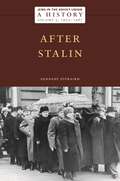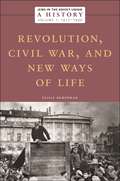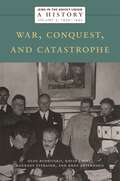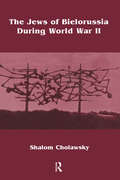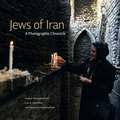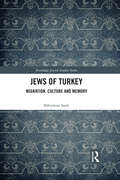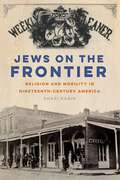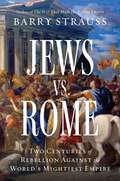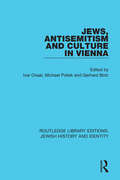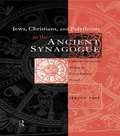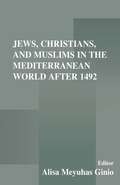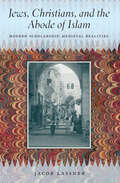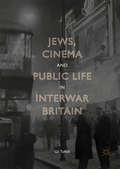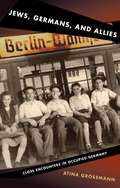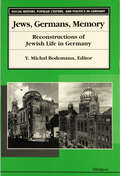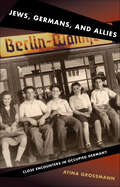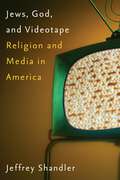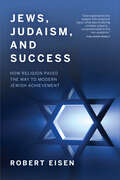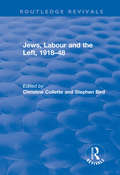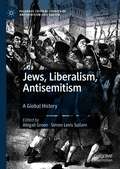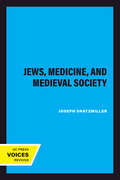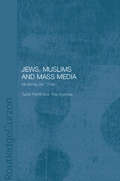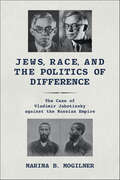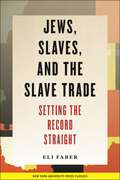- Table View
- List View
Jews in the Soviet Union: After Stalin, 1953–1967, Volume 5
by Gennady EstraikhOffers an analysis of Soviet Jewish society after the death of Joseph StalinAt the beginning of the twentieth century, more Jews lived in the Russian Empire than anywhere else in the world. After the Holocaust, the USSR remained one of the world’s three key centers of Jewish population, along with the United States and Israel. While a great deal is known about the history and experiences of the Jewish people in the US and in Israel in the twentieth century, much less is known about the experiences of Soviet Jews. Understanding the history of Jewish communities under Soviet rule is essential to comprehending the dynamics of Jewish history in the modern world. Only a small number of scholars and the last generation of Soviet Jews who lived during this period hold a deep knowledge of this history. Jews in the Soviet Union, a new multi-volume history, is an unprecedented undertaking. Publishing over the next few years, this groundbreaking work draws on rare access to documents from the Soviet archives, allowing for the presentation of a sweeping history of Jewish life in the Soviet Union from 1917 through the early 1990s.Volume 5 offers a history of Soviet Jewry from the demise of the brutal dictator Joseph Stalin to the military confrontation between Israel and Arab states in 1967 known as the Six-Day War. Both historic events deeply affected Soviet Jews, who numbered over two million in the wake of the Holocaust and still formed at that point the second-largest Jewish population in the world. Stalin’s death led to the release of political prisoners and the reduction of the level of fear in society. The economy was growing and conditions of life were improving. At the same time, the state had doubts about the loyalty of the Jewish population and imposed limitations on their educational and career prospects. The relatively liberal period associated with Nikita Khrushchev’s “thaw” after the Stalinist bitter frost became a prelude to the years when contemplation about, or practical steps toward, emigration to Israel or elsewhere began to play an increasing role in the lives of Soviet Jews. In this pioneering analysis of the “thaw” years in Soviet Jewish history, Gennady Estraikh focuses both on the factors driving emigration and dissent, and on those Jews who were able to attain a high standard of living, and to rise to esteemed positions in managerial, academic, bohemian, and other segments of the Soviet elite.
Jews in the Soviet Union: Revolution, Civil War, and New Ways of Life, 1917–1930, Volume 1
by Elissa BemporadChronicles the encounter of one of the largest Jewish communities in the world with war, revolution, and Soviet power from 1917 through 1930At the beginning of the twentieth century, more Jews lived in the Russian Empire than anywhere else in the world. After the Holocaust, the USSR remained one of the world’s three key centers of Jewish population, along with the United States and Israel. Yet while a great deal is known about the history and experiences of the Jewish people in the US and in Israel in the twentieth century, much less is known about the experiences of Soviet Jews. Jews in the Soviet Union, a new multi-volume history, is an unprecedented undertaking. This groundbreaking work draws on rare access to documents from the Soviet archives, allowing for the presentation of a sweeping history of Jewish life in the Soviet Union from 1917 through the early 1990s.Volume 1 tells the story of the ways in which Jews endured, adjusted to, and participated in the Soviet system both as individuals and as part of a Jewish collectivity during the first decade of its existence. The volume explores Jewish cultural, political, and social life in the different regions of the Soviet Union, integrating gender and women’s issues, narratives of historical elites and ordinary folk. It focuses on everyday life and discusses the fate of Jews in the Soviet Union both as Soviet citizens and as Jews. Chronicling the ways in which different Jews became Soviet in the 1920s, the volume reveals how the lines of contact between Jews in the Soviet Union and the outside world fluctuated between open antagonism and impassioned support.
Jews in the Soviet Union: War, Conquest, and Catastrophe, 1939–1945, Volume 3
by Gennady Estraikh Oleg Budnitskii David Engel Anna ShternshisProvides a comprehensive history of Soviet Jewry during World War IIAt the beginning of the twentieth century, more Jews lived in the Russian Empire than anywhere else in the world. After the Holocaust, the USSR remained one of the world’s three key centers of Jewish population, along with the United States and Israel. While a great deal is known about the history and experiences of the Jewish people in the US and in Israel in the twentieth century, much less is known about the experiences of Soviet Jews. Understanding the history of Jewish communities under Soviet rule is essential to comprehending the dynamics of Jewish history in the modern world. Only a small number of scholars and the last generation of Soviet Jews who lived during this period hold a deep knowledge of this history. Jews in the Soviet Union, a new multi-volume history, is an unprecedented undertaking. Publishing over the next few years, this groundbreaking work draws on rare access to documents from the Soviet archives, allowing for the presentation of a sweeping history of Jewish life in the Soviet Union from 1917 through the early 1990s.Volume 3 explores how the Soviet Union’s changing relations with Nazi Germany between the signing of a nonaggression pact in August 1939 and the Soviet victory over German forces in World War II affected the lives of some five million Jews who lived under Soviet rule at the beginning of that period. Nearly three million of those Jews perished; those who remained constituted a drastically diminished group, which represented a truncated but still numerically significant postwar Soviet Jewish community.Most of the Jews who lived in the USSR in 1939 experienced the war in one or more of three different environments: under German occupation, in the Red Army, or as evacuees to the Soviet interior. The authors describe the evolving conditions for Jews in each area and the ways in which they endeavored to cope with and to make sense of their situation. They also explore the relations between Jews and their non-Jewish neighbors, the role of the Soviet state in shaping how Jews understood and responded to their changing life conditions, and the ways in which different social groups within the Soviet Jewish population—residents of the newly-annexed territories, the urban elite, small-town Jews, older generations with pre-Soviet memories, and younger people brought up entirely under Soviet rule—behaved. This book is a vital resource for understanding an oft-overlooked history of a major Jewish community.
Jews of Bielorussia During Wwi
by CholawskyFirst Published in 1998. Routledge is an imprint of Taylor & Francis, an informa company.
Jews of Iran: A Photographic Chronicle (Dimyonot)
by Lior B. Sternfeld Hassan Sarbakhshian Parvaneh VahidmaneshThis book reveals one of the most beautiful and complicated untold stories of our time. Westerners often imagine Jews in Iran as a captive and oppressed community, alienated within their home nation yet restricted from leaving it. The reality is much more complex. Jews of Iran is a photographic journey through twenty-first-century Iran, providing a unique view of the country’s Jewish community in situations typically unknown to the Western world. Photojournalist Hassan Sarbakhshian spent two years living among Iran’s Jewish communities, joining them for holidays, family gatherings, and travels, and—with the help of fellow journalist Parvaneh Vahidmanesh—documenting how they lived. Moving beyond the well-known state and regional confrontations, the photos that Sarbakhshian took tell a broader story about a community of people who live in the figurative and literal middle. They are Iranian nationals by birth and by choice, and they are Jews by religious affiliation. Full loyalty to their country is expected, even as their ancestral homeland is at odds with their political homeland. This photographic chronicle illuminates the grey zone that they inhabit.Featuring over one hundred full-color photos, contextualized with extensive annotations, and accompanied by a substantive introduction written by historian Lior B. Sternfeld, Jews of Iran calls into question Western views of this religious community.
Jews of Tampa (Images of America)
by Dr Rob Norman Marcia Jo ZerivitzSpanish explorers arrived in Tampa Bay in the 16th century. Jews were first allowed to live in Florida in 1763 and less than 100 years later, Tampa became a city. The arrival of the railroad and the cigar industry in the 1890s attracted immigrants. Many were Jews, who helped propel growth, especially in Ybor City, where they owned more than 80 businesses. Over the decades, Jews participated in civic and Jewish organizations, the military, politics, and in developing Tampa as a sports center. Today, with about 23,000 Jews in Tampa, there are fifth-generation residents who represent the continuity of a people who contribute vibrancy to every area of the community.
Jews of Turkey: Migration, Culture and Memory (Routledge Jewish Studies Series)
by Süleyman ŞanlıJews of Turkey: Migration, Culture and Memory explores the culture of Jews who immigrated from East Turkey to Israel. The study reveals the cultural values of their communities, way of life, beliefs and traditions in the multicultural and multi-religious environment that was the East of Turkey. <p><p>The book presents their immigration processes, social relationships, and memories of their past from a cultural perspective. Consequently, this study reconstructs the life of Eastern Jews of Turkey before their immigration to Israel. The anthropological fieldwork for this research was carried out over a year in Israel. The author visited eleven cities, where he found Jewish communities from the Ottoman Empire. The book examines their history and origins, personal stories of their immigration, and different social aspects, such as their relationships with Muslims, other Jewish neighbourhoods, the family, childhood, status of women, marriages, clothing, cuisine, religious life, education, economic conditions, Shabbat and holidays. <p><p>This is the first book that discusses multiple Jewish communities living in Israel who moved from East Turkey. The book will be a valuable resource for researchers and students who are interested in Jewish and Israeli studies, Turkish minorities and anthropology. <p><p>Süleyman Şanlı is the chair of the anthropology department at Mardin Artuklu University, Turkey. He was a visiting scholar at the Moshe Dayan Center at Tel Aviv University, where he conducted the anthropological fieldwork on Jews who migrated to Israel from Turkey. His research interests are, Ottoman Jews, Jews of Turkey, Jewish cultural studies and social and cultural anthropology.
Jews on the Frontier: Religion and Mobility in Nineteenth-Century America (North American Religions)
by Shari RabinNational Jewish Book Award Winner: An &“enlightening&” history of how Jews forged their own religious culture as they ventured into the American wilderness (Choice).Finalist, 2017 Sami Rohr Prize for Jewish Literature, presented by the Jewish Book CouncilJews on the Frontier offers a religious history that begins in an unexpected place: on the road. Shari Rabin recounts the journey of Jewish people as they left Eastern cities and ventured into the American West and South during the nineteenth century. It brings to life the successes and obstacles of these travels, from the unprecedented economic opportunities to the anonymity and loneliness that complicated the many legal obligations of traditional Jewish life. Without government-supported communities or reliable authorities, where could one procure kosher meat? Alone in the American wilderness, how could one find nine co-religionists for a minyan (prayer quorum)? Without identity documents, how could one really know that someone was Jewish? Rabin argues that Jewish mobility during this time was pivotal to the development of American Judaism. In the absence of key institutions like synagogues or charitable organizations which had played such a pivotal role in assimilating East Coast immigrants, ordinary Jews on the frontier created religious life from scratch, expanding and transforming Jewish thought and practice.Jews on the Frontier vividly recounts the story of a neglected era in American Jewish history, offering a new interpretation of American religions, rooted not in congregations or denominations but in the politics and experiences of being on the move. This book shows that by focusing on everyday people, we gain a more complete view of how American religion has taken shape. This book follows a group of dynamic and diverse individuals as they searched for resources for stability, certainty, and identity in a nation where there was little to be found. &“Scholars of immigration have toiled for years on the question of how mobility affects nationalities and group identities alike…Rabin gives this framework an interesting twist by investigating mobility&’s influence on religion.&” ― American Jewish Archives Journal
Jews vs. Rome: Two Centuries of Rebellion Against the World's Mightiest Empire
by Barry StraussA new history of two centuries of Jewish revolts against the Roman Empire, drawing on recent archeological discoveries and new scholarship by leading historian Barry Strauss.Jews vs. Rome is a gripping account of one of the most momentous eras in human history: the two hundred years of ancient Israel&’s battles against Rome that reshaped Judaism and gave rise to Christianity. Barry Strauss vividly captures the drama of this era, highlighting the courageous yet tragic uprisings, the geopolitical clash between the empires of Rome and Persia, and the internal conflicts among Jews. Between 63 BCE and 136 CE, the Jewish people launched several revolts driven by deep-seated religious beliefs and resentment towards Roman rule. Judea, a province on Rome&’s eastern fringe, became a focal point of tension and rebellion. Jews vs. Rome recounts the three major uprisings: the Great Revolt of 66–70 CE, which led to the destruction of Jerusalem and the Temple, culminating in the Siege of Masada, where defenders chose mass suicide over surrender; the Diaspora Revolt, ignited by heavy taxes across the Empire; and the Bar Kokhba Revolt. We meet pivotal figures such as Simon Bar Kokhba but also some of those lesser-known women of the era like Berenice, a Jewish princess who played a major role in the politics of the Great Revolt and was improbably the love of Titus—Rome&’s future emperor and the man who destroyed Jerusalem and the Temple. Today, echoes of those battles resonate as the Jewish nation faces new challenges and conflicts. Jews vs. Rome offers a captivating narrative that connects the past with the present, appealing to anyone interested in Rome, Jewish history, or the compelling true tales of resilience and resistance.
Jews, Antisemitism and Culture in Vienna (Routledge Library Editions: Jewish History and Identity)
by Oxaal Ivar Pollak Michael Botz GerhardOriginally published in 1987, this book explores the emergence, structure and ultimate fate of the Viennese Jewish community. Thirteen eminent specialists on Viennese social, political and cultural history combine to cover a wide variety of topics, including the social and psychological causes of the highly successful and intellectually creative position held by the Jewish community as a minority within the larger Viennese society. They also analyse the conservative politics of the pre-1914 Jewish community, and their relationship both to Zionism and to Austro-Marxism. The book also traces the continuities with the past in interwar Austria and analyse the stages leading to the expulsion, expropriation and annihilation of the Jews in Nazi-dominated Austria. The book concludes with an examination of post-Holocaust antisemitism in Vienna.
Jews, Christians and Polytheists in the Ancient Synagogue (Baltimore Studies In The History Of Judaism Ser.)
by Steven FineJews, Christians and Polytheists in the Ancient Synagogue explores the ways in which divergent ethnic, national and religious communities interacted with one another within the synagogue in the Greco-Roman period. It presents new perspectives regarding the development of the synagogue and its significance of this institution for understanding religion and society under the Roman Empire.
Jews, Christians, and Muslims in the Mediterranean World After 1492
by Alisa Meyuhas GinioThe expulsion of the Jews, and later the Muslims from the Iberian Peninsula marked the beginning of a new era in the life of the Mediterranean world. The articles in this volume discuss the aftermath of the crucial historical events that took place in the Mediterranean world in 1492, focusing on the social, economic and cultural consequences of these occurrences.
Jews, Christians, and the Abode of Islam: Modern Scholarship, Medieval Realities
by Jacob Lassner&“One of the greatest authorities on medieval Islam&” sheds &“immensely stimulating&” new light on cross-cultural relations in the Middle Ages (Times Literary Supplement, UK). In Jews, Christians, and the Abode of Islam, historian Jacob Lassner examines the relationship between the three Abrahamic faiths that defined their political and cultural interaction during the Middle Ages—and continues to define them today. Examining the debates taking place in modern Western scholarship on Islam, Lassner sheds new light on the social and political status of medieval Jews and Christians in various Islamic lands from the seventh to the thirteenth century. Using a vast array of primary sources, Lassner balances the rhetoric of literary and legal texts from the Middle Ages with other, newly discovered medieval sources that describe life as it was actually lived among the three faith communities. Lassner demonstrates what medieval Muslims meant when they spoke of tolerance, and how that abstract concept played out at different times and places in the Christian and Jewish communities under Islamic rule. Finally, he considers how this new understanding of medieval Islamic civilization might affect the highly contentious global environment of today.
Jews, Cinema and Public Life in Interwar Britain
by Gil ToffellThis book investigates a Jewish orientation to film culture in interwar Britain. It explores how pleasure, politics and communal solidarity intermingled in the cinemas of Jewish neighbourhoods, and how film was seen as a vessel through which Jewish communal concerns might be carried to a wider public. Addressing an array of related topics, this volume examines the lived expressive cultures of cinemas in Jewish areas and the ethnically specific films consumed within these sites; the reception of film stars as representations of a Jewish social body; and how an antisemitic canard that understood the cinema as a Jewish monopoly complicated its use as a base for anti-fascist activity. In shedding light on an unexplored aspect of British film reception and exhibition, Toffell provides a unique insight into the making of the modern city by migrant communities. The title will be of use to anyone interested in Britain’s interwar leisure landscape, the Jewish presence in modernity, and a cinema studies sensitised to the everyday experience of audiences.
Jews, Germans and Allies: Close Encounters in Occupied Germany
by Atina GrossmannIn the immediate aftermath of World War II, more than a quarter million Jewish survivors of the Holocaust lived among their defeated persecutors in the chaotic society of Allied-occupied Germany. Jews, Germans, and Allies draws upon the wealth of diary and memoir literature by the people who lived through postwar reconstruction to trace the conflicting ways Jews and Germans defined their own victimization and survival, comprehended the trauma of war and genocide, and struggled to rebuild their lives. In gripping and unforgettable detail, Atina Grossmann describes Berlin in the days following Germany's surrender--the mass rape of German women by the Red Army, the liberated slave laborers and homecoming soldiers, returning political exiles, Jews emerging from hiding, and ethnic German refugees fleeing the East. She chronicles the hunger, disease, and homelessness, the fraternization with Allied occupiers, and the complexities of navigating a world where the commonplace mingled with the horrific. Grossmann untangles the stories of Jewish survivors inside and outside the displaced-persons camps of the American zone as they built families and reconstructed identities while awaiting emigration to Palestine or the United States. She examines how Germans and Jews interacted and competed for Allied favor, benefits, and victim status, and how they sought to restore normality--in work, in their relationships, and in their everyday encounters. Jews, Germans, and Allies shows how Jews were integral participants in postwar Germany and bridges the divide that still exists today between German history and Jewish studies.
Jews, Germans, Memory: Reconstructions of Jewish Life in Germany (Social History, Popular Culture, And Politics In Germany)
by Y. Michal BodemannHow was it possible that a new and sizeable Jewish community developed after the Holocaust in Germany of all places? Jews, Germans, Memory undertakes to assess the past, present, and future of German-Jewish relations in the light of recent political changes and the opening up of historical resources. This welcome new volume investigates how the groundwork was laid for the new Jewish community in the post-war period, with different objectives by Jewish leaders and German politicians. Its contributors touch upon history, literature, the media, ethnicity, politics, and social movements, and attempt to answer the question of how Jews are socially constructed and how the glorious German Jewish past and the Holocaust have been remembered in the course of recent decades. In recent years, German Jewry has seen fundamental transformations with the influx from Eastern Europe and a new leadership in the community. A new self-definition, even self-assurance and reappraisal in Israel and elsewhere, has evolved. Historians, scholars of cultural studies, and those interested in debates on memory and ethnicity will all find something of interest in this diverse volume. Jews, Germans, Memory joins in debate Michael Brenner, Micha Brumlik, Dan Diner, Cilly Kugelmann, and Martin Löw-Beer, among the most prominent younger Jewish intellectuals in Germany today, with others who have long observed Germany from both inside and outside: Y. Michal Bodemann, John Borneman, Andrei Markovits, Robin Ostrow, Moishe Postone, Frank Stern, and Jack Zipes. Y. Michal Bodemann is Professor of Sociology, University of Toronto.
Jews, Germans, and Allies: Close Encounters in Occupied Germany
by Atina GrossmannIn the immediate aftermath of World War II, more than a quarter million Jewish survivors of the Holocaust lived among their defeated persecutors in the chaotic society of Allied-occupied Germany. Jews, Germans, and Allies draws upon the wealth of diary and memoir literature by the people who lived through postwar reconstruction to trace the conflicting ways Jews and Germans defined their own victimization and survival, comprehended the trauma of war and genocide, and struggled to rebuild their lives. In gripping and unforgettable detail, Atina Grossmann describes Berlin in the days following Germany's surrender--the mass rape of German women by the Red Army, the liberated slave laborers and homecoming soldiers, returning political exiles, Jews emerging from hiding, and ethnic German refugees fleeing the East. She chronicles the hunger, disease, and homelessness, the fraternization with Allied occupiers, and the complexities of navigating a world where the commonplace mingled with the horrific. Grossmann untangles the stories of Jewish survivors inside and outside the displaced-persons camps of the American zone as they built families and reconstructed identities while awaiting emigration to Palestine or the United States. She examines how Germans and Jews interacted and competed for Allied favor, benefits, and victim status, and how they sought to restore normality--in work, in their relationships, and in their everyday encounters.Jews, Germans, and Allies shows how Jews were integral participants in postwar Germany and bridges the divide that still exists today between German history and Jewish studies.
Jews, God, and Videotape: Religion and Media in America
by Jeffrey ShandlerA pioneering examination of the impact of new communications technologies and media practices on the religious life of American JewryEngaging media has been an ongoing issue for American Jews, as it has been for other religious communities in the United States, for several generations. Shandler’s examples range from early recordings of cantorial music to Hasidic outreach on the Internet. In between he explores mid-twentieth-century ecumenical radio and television broadcasting, video documentation of life cycle rituals, museum displays and tourist practices as means for engaging the Holocaust as a moral touchstone, and the role of mass-produced material culture in Jews’ responses to the American celebration of Christmas.Shandler argues that the impact of these and other media on American Judaism is varied and extensive: they have challenged the role of clergy and transformed the nature of ritual; facilitated innovations in religious practice and scholarship, as well as efforts to maintain traditional observance and teachings; created venues for outreach, both to enhance relationships with non-Jewish neighbors and to promote greater religiosity among Jews; even redefined the notion of what might constitute a Jewish religious community or spiritual experience. As Jews, God, and Videotape demonstrates, American Jews’ experiences are emblematic of how religious communities’ engagements with new media have become central to defining religiosity in the modern age.
Jews, Judaism, and Success: How Religion Paved the Way to Modern Jewish Achievement
by Robert EisenIn Jews, Judaism, and Success, Robert Eisen attempts to solve a long-standing mystery that has fascinated many: How did Jews become such a remarkably successful minority in the modern Western world? Eisen argues that Jews achieved such success because they were unusually well-prepared for it by their religion – in particular, Rabbinic Judaism, or the Judaism of the rabbis. Rooted in the Talmud, this form of Judaism instilled in Jews key values that paved the way for success in modern Western society: autonomy, freedom of thought, worldliness, and education. The book carefully analyses the evolution of these four values over the past two thousand years in order to demonstrate that they had a longer and richer history in Jewish culture than in Western culture. The book thus disputes the common assumption that Rabbinic Judaism was always an obstacle to Jews becoming modernized. It demonstrates that while modern Jews rejected aspects of Rabbinic Judaism, they also retained some of its values, and these values in particular led to Jewish success. Written for a broad range of readers, Jews, Judaism, and Success provides unique insights on the meaning of success and how it is achieved in the modern world.
Jews, Labour and the Left, 1918–48 (Routledge Revivals Ser.)
by Stephen Bird Christine ColletteThis title was first published in 2000. With the advent of the Second World War, fascism became inextricably associated with anti-Semitism. It is hardly surprising, therefore, to find that a significant number of Jewish people were politically inclined towards the left and were actively involved in socialist movements. The essays in this volume seek to arrive at an understanding of Jewish involvement in Labour movements outside Israel from the end of the First World War to the final stages of World War Two. This was a period which saw the creation of several international socialist institutions. Gail Malmgreen looks at the American Jewish Labor Committee and examines the interaction between trades unions and the Jewish community. Deborah Osmond, Christine Collette and Jason Heppell discuss the contributions made by Jews living in Britain to Labour politics, including the Communist Party of Great Britain and the Labour and Socialist International. The reactions and stances of the British Labour party in relation to Zionism and the Holocaust are the subjects of essays by Isabelle Tombs and Paul Kelemen. David De Vries's study of the position of Jewish white-collar workers in British-ruled Palestine provides another perspective on the complex web of relationships between British and Jewish identity, class, labour and politics. An invaluable bibliography by Arieh Lebowitz of sources for the study of Jewish interaction with the American and British Labour movements completes this important survey.
Jews, Liberalism, Antisemitism: A Global History (Palgrave Critical Studies of Antisemitism and Racism)
by Abigail Green Simon Levis Sullam“This is a timely contribution to some of the most pressing debates facing scholars of Jewish Studies today. It forces us to re-think standard approaches to both antisemitism and liberalism. Its geographic scope offers a model for how scholars can “provincialize” Europe and engage in a transnational approach to Jewish history. The book crackles with intellectual energy; it is truly a pleasure to read.”- Jessica M. Marglin, University of Southern California, USAGreen and Levis Sullam have assembled a collection of original, and provocative essays that, in illuminating the historic relationship between Jews and liberalism, transform our understanding of liberalism itself. - Derek Penslar, Harvard University, USA“This book offers a strikingly new account of Liberalism’s relationship to Jews. Previous scholarship stressed that Liberalism had to overcome its abivalence in order to achieve a principled stand on granting Jews rights and equality. This volume asserts, through multiple examples, that Liberalism excluded many groups, including Jews, so that the exclusion of Jews was indeed integral to Liberalism and constitutive for it. This is an important volume, with a challenging argument for the present moment.”- David Sorkin, Yale University, USAThe emancipatory promise of liberalism – and its exclusionary qualities – shaped the fate of Jews in many parts of the world during the age of empire. Yet historians have mostly understood the relationship between Jews, liberalism and antisemitism as a European story, defined by the collapse of liberalism and the Holocaust. This volume challenges that perspective by taking a global approach. It takes account of recent historical work that explores issues of race, discrimination and hybrid identities in colonial and postcolonial settings, but which has done so without taking much account of Jews. Individual essays explore how liberalism, citizenship, nationality, gender, religion, race functioned differently in European Jewish heartlands, in the Mediterranean peripheries of Spain and the Ottoman empire, and in the North American Atlantic world.
Jews, Medicine, and Medieval Society: A Phenomenology Of Miscarriage
by Joseph ShatzmillerJews were excluded from most professions in medieval, predominantly Christian Europe. Bigotry was widespread, yet Jews were accepted as doctors and surgeons, administering not only to other Jews but to Christians as well. Why did medieval Christians suspend their fear and suspicion of the Jews, allowing them to inspect their bodies, and even, at times, to determine their survival? What was the nature of the doctor-patient relationship? Did the law protect Jewish doctors in disputes over care and treatment?Joseph Shatzmiller explores these and other intriguing questions in the first full social history of the medieval Jewish doctor. Based on extensive archival research in Provence, Spain, and Italy, and a deep reading of the widely scattered literature, Shatzmiller examines the social and economic forces that allowed Jewish medical professionals to survive and thrive in thirteenth- and fourteenth-century Europe. His insights will prove fascinating to scholars and students of Judaica, medieval history, and the history of medicine.
Jews, Muslims and Mass Media: Mediating the 'Other' (Routledge Jewish Studies Series)
by Tudor Parfitt Yulia EgorovaThis text looks at the ways in which Jews, Muslims and the conflict between them has been covered in the modern media. Both Jews and Muslims generally receive a 'bad press'. This book will try to reveal why. The media have clearly played a pro-active role in the Middle East conflict, the coverage of which is obscured by the contrasting images of Jew and Muslim in western thought.
Jews, Race, and the Politics of Difference: The Case of Vladimir Jabotinsky against the Russian Empire (Jews in Eastern Europe)
by Marina B. MogilnerJews, Race, and the Politics of Difference explores how Russian Jewish writers and political activists such as Vladimir Jabotinsky turned to "race" as an operational concept in the late imperial politics of the Russian Empire.Building on the latest scholarship on racial thinking and Jewish identities, Marina Mogilner shows how Jewish anthropologists, ethnographers, writers, lawyers, and political activists in late imperial Russia sought to construct a Jewish identity based on racial categorization in addition to religious affiliation. By grounding nationality not in culture and territory but in blood and biology, race offered Jewish nationalists in Russia a scientifically sound and politically effective way to reaffirm their common identity.Jews, Race, and the Politics of Difference presents the works of Jabotinsky as a lens to understanding Jewish "self-racializing," and brings Jews and race together in a framework that is more multifaceted and controversial than that implied by the usual narratives of racial antisemitism.
Jews, Slaves, and the Slave Trade: Setting the Record Straight (New Perspectives on Jewish Studies #6)
by Eli FaberLays to rest the controversial myth of Jewish involvement in the slave tradeIn the wake of the civil rights movement, a great divide opened up between African American and Jewish communities. What was historically a harmonious and supportive relationship suffered from a powerful and oft-repeated legend, that Jews controlled and masterminded the slave trade and owned slaves on a large scale, well in excess of their own proportion in the population.In this groundbreaking book, likely to stand as the definitive word on the subject, Eli Faber cuts through this cloud of mystification to recapture an important chapter in both Jewish and African diasporic history.Focusing on the British empire, Faber assesses the extent to which Jews participated in the institution of slavery through investment in slave trading companies, ownership of slave ships, commercial activity as merchants who sold slaves upon their arrival from Africa, and direct ownership of slaves. His unprecedented original research utilizes shipping and tax records, stock-transfer ledgers, censuses, slave registers, and synagogue records. These materials reveal, once and for all, the minimal nature of Jews' involvement in the subjugation of Africans in the Americas.A crucial corrective, Jews, Slaves, and the Slave Trade lays to rest one of the most contested historical controversies of our time.
